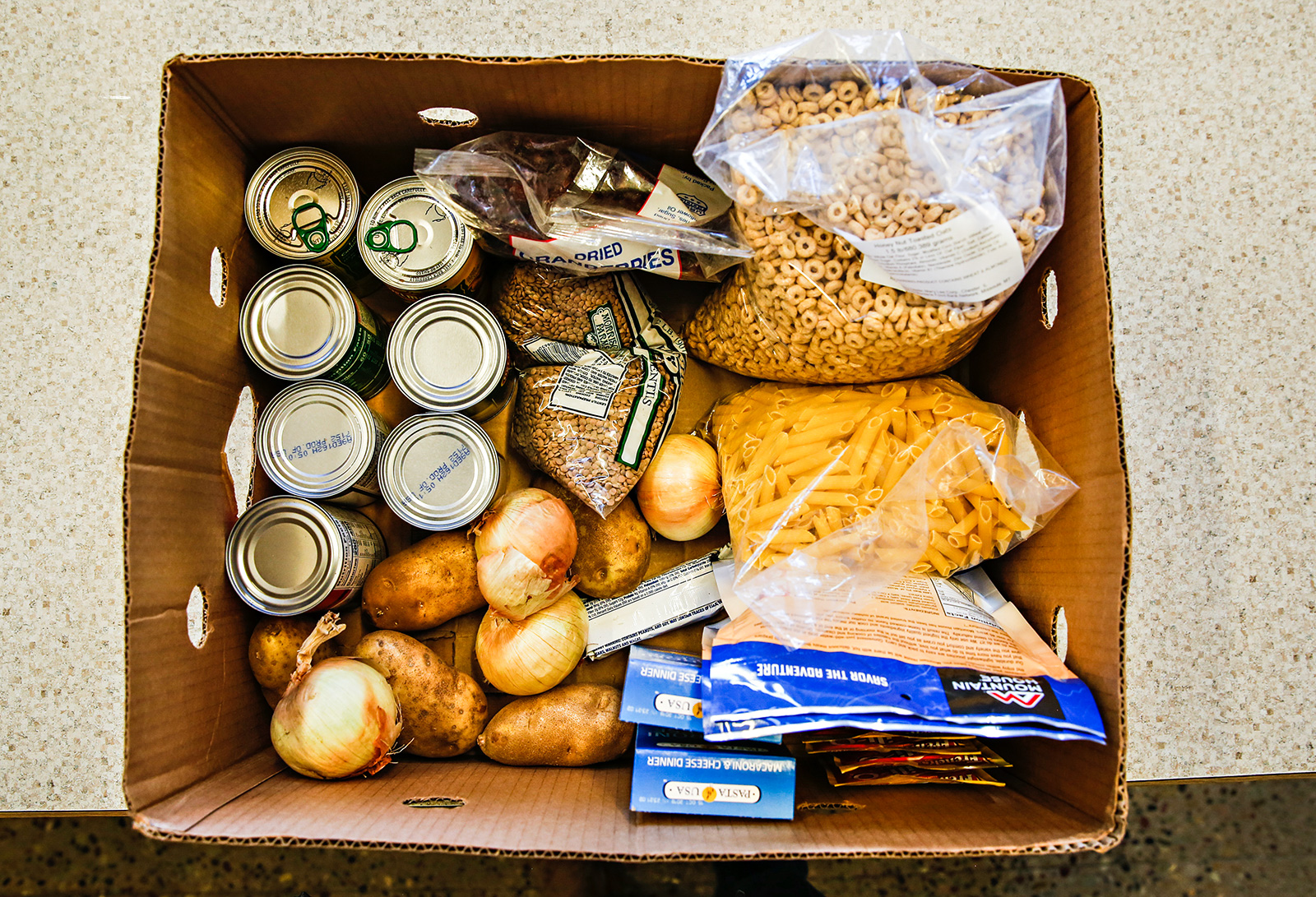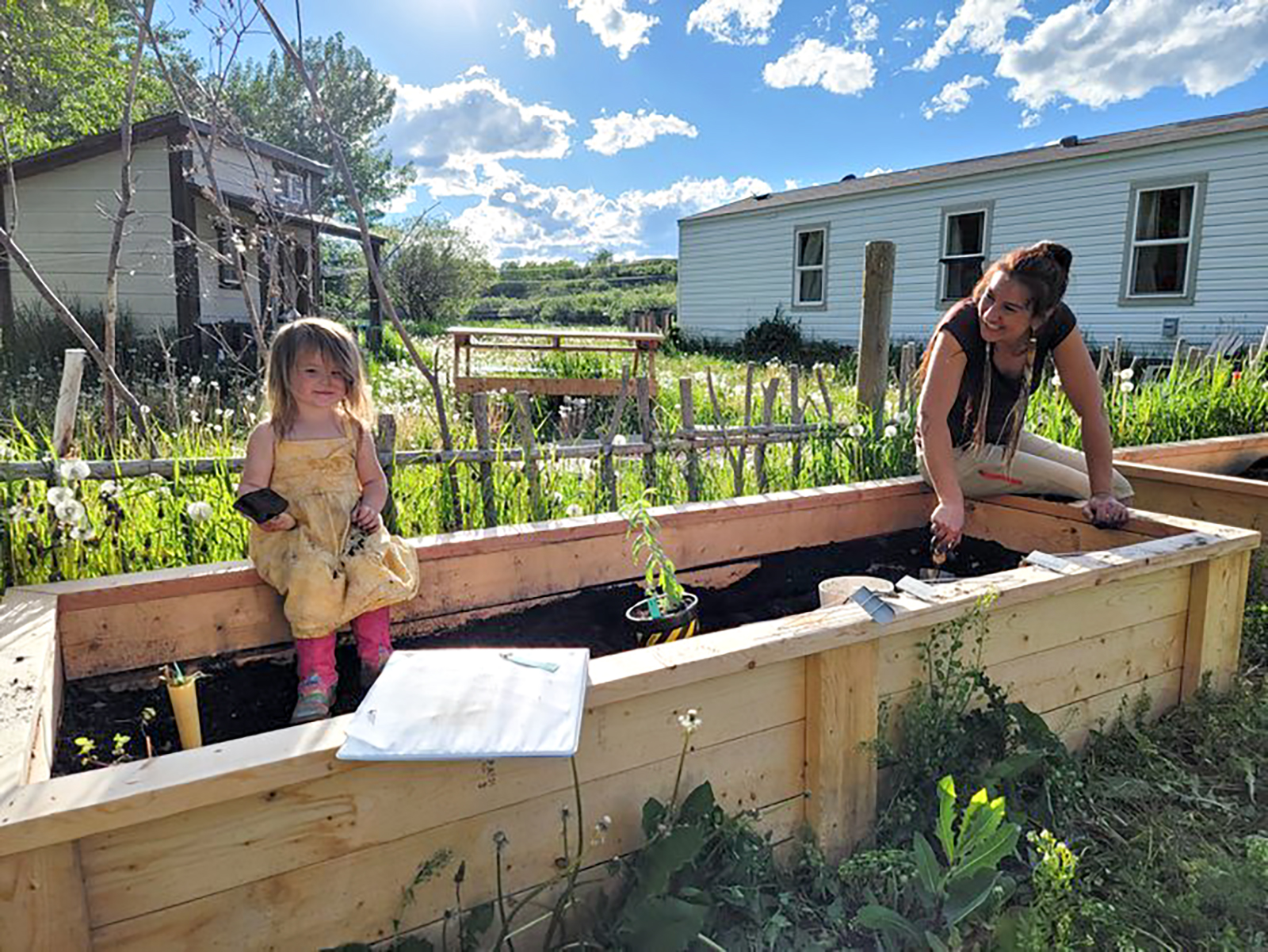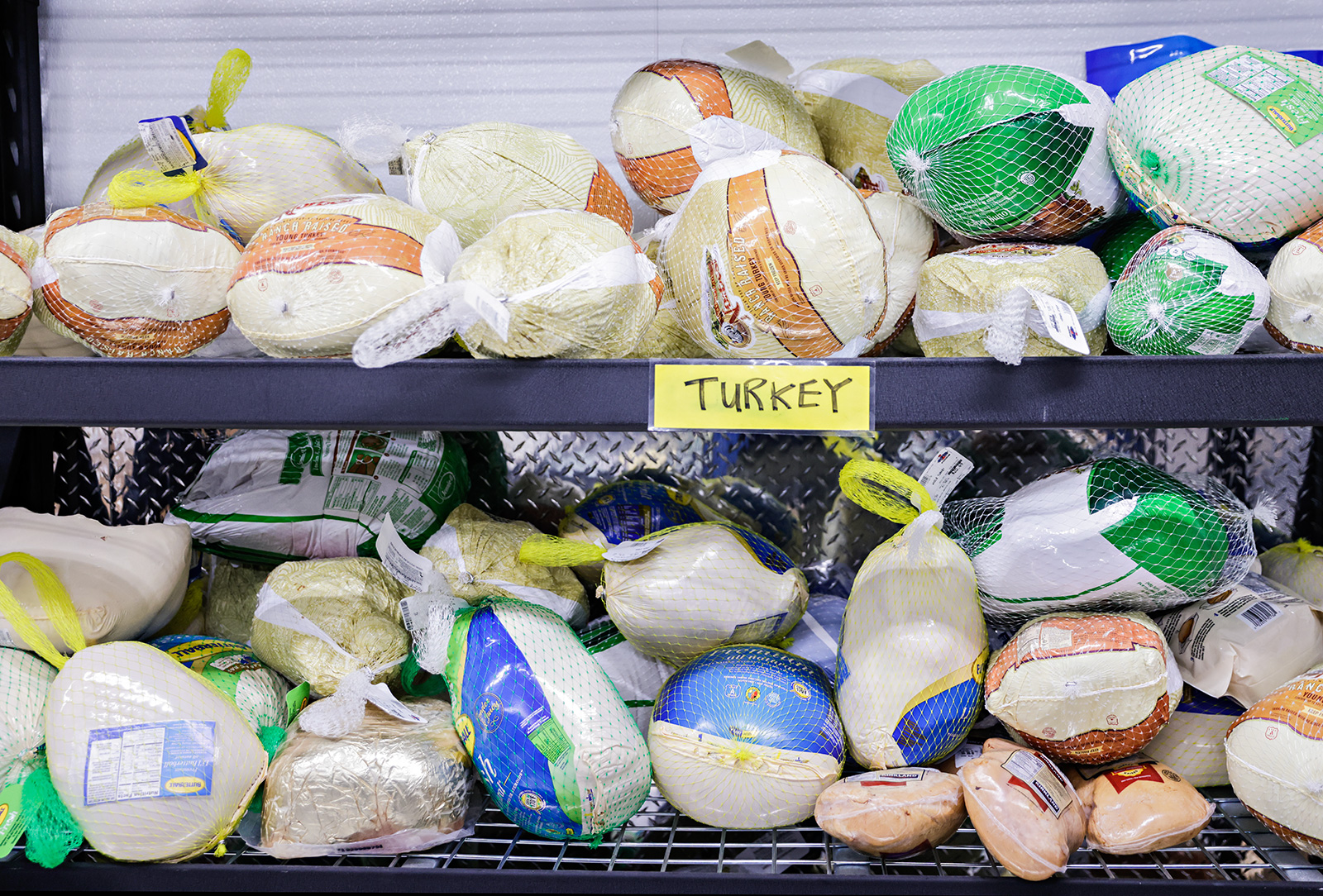‘You Can’t Let Us Starve’: Food Bank Directors, Blackfeet Leaders Brace for ‘Food Emergency’ as SNAP Benefits Cliff
The U.S. Department of Agriculture said it can’t legally dole out SNAP funds in November during the government shutdown, despite previous assurances federal funding would continue. More than 77,000 Montanans would be affected by the delay, which is unprecedented in the food-assistance program's history.
By Mariah Thomas & Zoë Buhrmaster
Chris Sidmore, the executive director of the Flathead Food Bank, understands on a personal level what the Supplemental Nutrition Assistance Program (SNAP) can offer to a family.
“It’s kind of funny how life works,” Sidmore said. “Sometimes, I think back on things in the past, and it seems like another lifetime ago, but … when I was a teenager, I was raised by a single mom, and we used SNAP benefits. I just think, like, I was a kid. I had no control over that, but man, it made a huge difference. That’s really one of the things that allowed us to, you know, have some food on our plate, which was great.”
The program Sidmore relied on to feed him in his youth today helps more than 77,000 Montanans pay for their groceries. That includes more than 5,800 people in Flathead County, nearly 2,800 in Glacier County and over 2,300 in Lincoln County.
But as the federal government shutdown presses into its fifth week with no end in sight, SNAP benefits are set to stall in November, marking the first time in the program’s history that benefits will be delayed.
The shutdown of the federal government started Oct. 1 as lawmakers failed to approve a continuing resolution to keep the government open. At the center of the shutdown are pandemic-era Affordable Care Act subsidies that, if unrenewed, will cause health insurance premiums to skyrocket. Throughout the shutdown, Democrats and Republicans have pointed the finger at each other, claiming the other side refuses to come to the bargaining table. Montana’s congressional delegation — all Republicans — have branded the shutdown as a “Schumer Shutdown,” after Senate Minority Leader Chuck Schumer, D-New York.
“Senator (Steve) Daines supports SNAP funding for Montanans who need it the most and will continue fighting to reopen the government,” Daines spokesperson Gabby Wiggins wrote in an email Wednesday. “Chuck Schumer should end his pointless political theater and do the job elected representatives are supposed to do: serve the American people.”
As the shutdown continues, the federal government has claimed it can’t legally tap into emergency funds to keep SNAP running. It’s a claim dozens of states have pushed back on in a lawsuit, asking the U.S. District Court for the District of Massachusetts to rule on their motion by Friday. Montana is not among them.
The Montana Food Bank Network has, however, urged Gov. Greg Gianforte to use state funds to maintain the program during the shutdown. The governor’s office has said Montana can’t do that. A handful of other states have pulled from local coffers to maintain funding from anywhere from a few days into November to the whole month, or to bolster local food banks.
“While the governor believes these benefits are vital for vulnerable Montanans, he has been clear that the state cannot fund this federal program, which is funded by federal dollars, without promises for reimbursement,” Kaitlin Price, Gianforte’s communications director, wrote in an email to the Beacon. “Gov. Gianforte continues to urge Senate Democrats to do their job and pass a continuing resolution instead of holding taxpayer dollars hostage that fund these critical programs.”
Those in the business of food access in the Flathead haven’t minced words about the way the SNAP gap will affect people. At least one food bank director and the Blackfeet Nation have referred to the upcoming benefit cliff as an “emergency.”
“I always like to remind people too, these are real people behind the numbers,” Sidmore said. “You know, these are people with cancer, these are people that are coming through very tough situations. It’s real people, right here in our valley.”

On Tuesday, the Blackfeet Tribal Business Council declared a state of emergency in response to the “ongoing SNAP crisis.”
In anticipation of the benefits stalling at the beginning of November, the Tribal Council authorized the culling of bison from the Blackfeet Nation herd along with an elk harvest.
“The processed meat will be distributed directly to community members to help sustain food access during this period of uncertainty,” Tribal Council members stated. “This proactive measure is part of a broader effort by the Council to safeguard essential food distribution programs, particularly as the future of the SNAP remains uncertain.”
By Wednesday, 15 bison had been killed and were on their way to be processed before being split between the federally funded Blackfeet Food Distribution Program and FAST Blackfeet, a nonprofit that hosts a food pantry and focuses on Tribal food sovereignty.
The nonprofit receives most of its funds from private foundations, individuals, and grants. Co-director Iris Sharp said that since the shutdown began Oct. 1, the Ōyō•ṗ Food Pantry has seen an uptick in visitors, many of them new faces. FAST Blackfeet staff have been working to shore up resources, but the spike in food distribution has been felt.
“We’re pretty close to being over our food budget, if not already over,” Sharp said. “It’s something that we’ve been trying to prepare for since cuts were made in the Big Beautiful Bill.”
Having the Tribal Council provide bison makes a difference, Sharp said. The Town Pump in Browning is also hosting a food drive for FAST Blackfeet’s pantry through the end of November. Every dollar donated will be matched by the convenience store company. Nonprofit staff have also begun to put out feelers for helping hands in the community, as the pantry relies heavily on volunteers with only three employed workers.
The Blackfeet Food Distribution Program provides food to income-eligible residents and is funded by the U.S. Department of Agriculture (USDA). It serves as an alternative federal resource – meaning residents cannot be enrolled in SNAP at the same time.
We believe that food is medicine. SNAP also provides access to that medicine. It’s important to get the attention of our leadership in the political world and make sure they can hear us — you can’t let us starve.
Iris Sharp, co-director of FAST Blackfeet
Director Earl Heavyrunner has worked at the distribution program for over 20 years. He recalls handing out food during the Covid-19 pandemic, when the number of enrolled households in the programs hung around 460. Around 50 new people have joined the program in the past few weeks, Heavyrunner said. At the Blackfeet Food Bank, a Tribe-funded pantry which shares a building with the federal program, there’s been upwards of 100 new applicants in recent days.
As of Wednesday, 706 people were enrolled in the Blackfeet Food Distribution Program.
“I’ve never seen this before,” Heavyrunner said. “Our workload has probably increased by about 50%. We’re going down an avenue that we’ve never really been down before.”
Once the bison is processed, the distribution program and FAST Blackfeet will portion out shares to the community. What exactly that will look like is still in the works.
“We’re taking in all the furloughed workers, signing them up and issuing them commodities,” Heavyrunner said. “Anyone on SNAP, they’re being unenrolled from SNAP and coming over to the commodity program.”
To help meet the need, the distribution program is also accepting food from local ranchers, noting that agricultural donations may qualify for a tax write-off. Heavyrunner has seen quite a bit of donated beef come in, along with elk, other produce and canned goods. In the coming weeks, they plan on putting together boxes for households that contain enough food to last one or two weeks.
“We believe that food is medicine,” Sharp said. “SNAP also provides access to that medicine. It’s important to get the attention of our leadership in the political world and make sure they can hear us – you can’t let us starve.”

For local food bank directors like Sophie Albert, at the North Valley Food Bank in Whitefish, the dearth of benefits means they’re anticipating greater demand and working to meet it.
But even as they plan to do all they can to meet the needs, the benefits cliff comes at a difficult time. Food banks have seen cuts to grant programs they typically rely on this year, are bracing for upcoming SNAP cuts following the passage of the One Big Beautiful Bill, and community-wide needs are already higher-than-normal during the holiday season. Albert said it feels like her organization is facing down a “food emergency.”
“Really, food banks are the number one place where people will come,” Albert said.
Albert estimates about 1,400 families who rely on SNAP benefits could begin turning to the North Valley Food Bank for help should November payments stall. That comes in addition to the 1,200 customers per week the food bank already sees.
Quinn, with the Bigfork Food Bank, said it’s typical for the food bank to handle between 100 and 110 households for the Thanksgiving holiday. The food bank also sees higher demand during the holiday stretch. She said she doesn’t yet know how those numbers could change without SNAP.
The Bigfork Food Bank has authorized volunteer shoppers to start purchasing extra food in preparation for the increased demand. The North Valley Food Bank and Flathead Food Bank similarly said they’ve taken steps to increase the amount of food they have on hand. Albert and her staff also expanded their hours at the North Valley Food Bank earlier this year, in anticipation of increased demand from the Big Beautiful Bill’s SNAP cuts.
Across the board, the Bigfork, North Valley and Flathead food banks encouraged people struggling without SNAP to reach out for help.
“We just really believe that food is just a basic human right,” Sidmore, of the Flathead Food Bank, said.
They also encouraged their communities to engage with local food banks – whether it be attending a food bank event, donating food or money, filling a volunteer shift or calling their representatives or the governor to advocate for SNAP funding.
Some said they’ve been heartened by the ways people are already stepping up to help. Sidmore, for example, said the local Rotary Club and the Lions Club of Evergreen have already begun organizing food drives to help provide donations to the Flathead Food Bank.
“It’s not just, ‘this is going away and it’s theoretical,’” Sidmore said. “It’s, ‘this is going away, and this could impact people.’ And I think of the analogy of squishing a water balloon. You know, the problems aren’t just disappearing. It goes somewhere.”